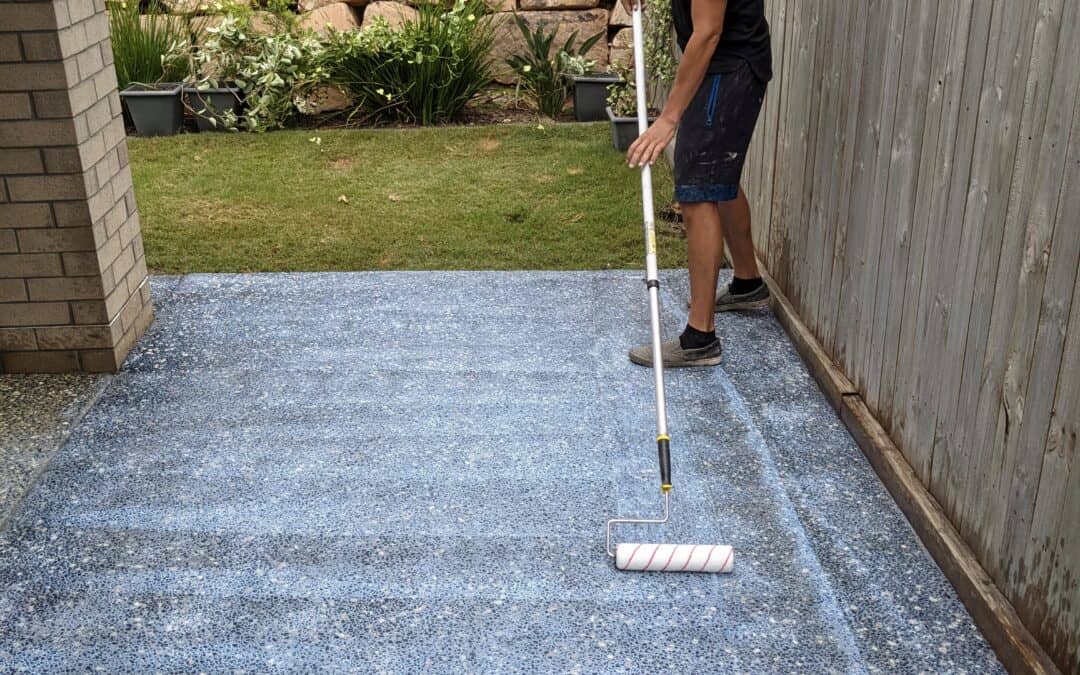The answer to this question is – yes! A concrete sealer or exposed aggregate sealer is essential for protecting surfaces from the elements, stains from dirt, oil and other contaminants, and much more.
So, if you’ve just installed new concrete, whatever kind, make sure it gets sealed before it gets unsightly marks or stains that are permanent.
No matter what kind of concrete, a good concrete sealer or exposed aggregate sealer will keep it looking spectacular for many years to come while extending its service life.
Even if the surface begins to show wear after years of exposure to traffic and the environment, you can often keep it looking its best with a good clean and a good concrete sealer application.
Sealing your outdoor concrete
Sealing outdoor concrete surfaces is an essential part of hardscape maintenance. A concrete sealer is a lot like car wax – many people go without it and then regret it when the paint peels.
A concrete sealer may not seem necessary at first, as the concrete looks good when freshly laid, but after a few weeks or months of exposure to weather and use concrete can become discoloured, stained and ugly.
There are many kinds of sealers, therefore we advise talking to an expert about the finish you wish to achieve. If it’s plain concrete, use a water-based concrete sealer, if it’s exposed aggregate you can use a water-based exposed aggregate sealer.
A water-based penetrating sealer or densifier, such as silanes, siloxanes, silicates and silicas, penetrate into the concrete to form a chemical barrier that shields against moisture penetration and contaminants.
Usually, they provide invisible protection without changing the surface appearance, and most products are breathable, allowing moisture vapour to escape. They are most commonly used outdoors since they provide excellent protection against harsh exposure conditions.
Applications
A waterbased penetrating concrete sealer or exposed aggregate sealer is your best choice if your goal is to:
- Protect exterior concrete surfaces subject to corrosion
- Obtain a natural finish
- Provide invisible protection without changing the surface appearance or leaving a sheen
For driveways and walkways where good traction is important, a water-based sealer is a better choice than a film-forming product, such as an acrylic or polyurethane because a water-based penetrating sealer does not leave a glossy film, it will not contribute to the slipperiness of the concrete surface.
How to apply a sealer
If you like to DIY then its a straightforward job and you can use:
- a low-pressure, high-volume sprayer
- a pump-up garden-type sprayer
- a roller
For your outdoor concrete or exposed aggregate a good concrete sealer or exposed aggregate sealer is usually better than a film-forming product for safety reasons, but also because the end result will last longer and looks more realistic and natural, especially when sealing stamped or stencilled concrete.
We recommend that all types of exterior concrete should be sealed including plain concrete, exposed aggregate, stamped concrete, stained concrete, integrally coloured concrete, stencilled concrete, engraved concrete and overlays.
Each surface lends itself to unique needs when it comes to applying the right sealer. For more information, call us to discuss.

